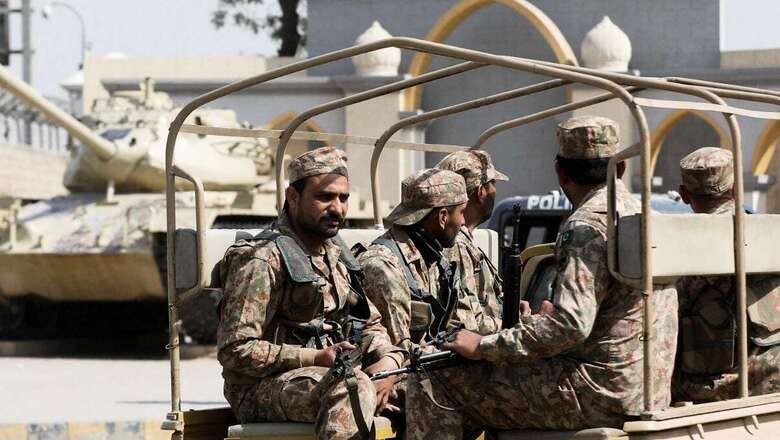
views
Pakistan finds itself entangled in a complex web of security dilemmas, with militant factions freely executing operations across the contentious terrains of Khyber Pakhtunkhwa (KPK) and Balochistan. Most of these assaults have been attributed to Tehreek-e-Taliban Pakistan (TTP), Balochistan Liberation Army (BLA) and the Islamic State Khorasan Province (ISKP). Pakistan has been holding external forces, notably the Afghan Taliban, responsible for these attacks. However, for a more realistic assessment, Pakistan officials need to introspect and tackle the domestic issues fueling this surge in violence.
More critically, it demands of Islamabad an urgent recalibration of its regional diplomacy. Pakistan needs to move away from using ‘terrorism’ as an instrument of statecraft as it is coming back to bite the hand that has fed it for so long.
Over the last three weeks, Pakistan has been rocked by a wave of terror incidents, with four significant attacks occurring in quick succession across KPK and Balochistan. On March 16, an assault orchestrated by militants from the Hafiz Gul Bahadur faction of TTP targeted a military outpost in North Waziristan’s Mir Ali area, claiming the lives of seven members of the Pakistan military, among them a Lieutenant Colonel and a Captain. This act of violence ignited widespread condemnation and a clamour for retribution among Pakistanis, drawing vows of vengeance from the nation’s highest echelons, ranging from the president to the prime minister and top military officials.
President Asif Ali Zardari, while paying his respects at the funeral of Lt Col Syed Kashif Ali, stated, “Pakistan would not hesitate to retaliate against any aggression, whether from across its borders or within its own lands.” In the midst of this fervent response, and just as the Pakistan Army’s Inter-Services Public Relations (ISPR) disclosed the neutralisation of the attack’s architects in a North Waziristan confrontation, Pakistan launched airstrikes on March 18 against militant strongholds in Afghanistan’s Paktika and Khost provinces, believed to be bastions of Hafiz Bahadur’s faction.
Subsequent to these events, Baloch nationalist insurgents struck at the heavily guarded Gwadar Port Authority Complex, a facility under Chinese operation, on March 20. This attack was swiftly followed by a severe offensive against the Pakistan Naval Station (PNS) Siddique in Turbat, Balochistan. Additionally, on the same day, a suicide bombing targeted a convoy escorting Chinese engineers, culminating in the tragic demise of five Chinese individuals in the northwest region of Khyber Pakhtunkhwa. The nature of these security lapses points to a diminishing control of the Pakistani military over the nation’s security framework, casting shadows over its capability to plug these breaches effectively. Particularly telling is the assault on the Gwadar Port, which stands as a stark illustration of the perilous fallout from Pakistan’s long-standing use of ‘terror’ as a state instrument.
This is further highlighted by the involvement of Hafiz Gul Bahadur’s faction in the Mir Ali incident. Hafiz Gul Bahadur, who once served as a significant military collaborator with the Pakistan Army in North Waziristan, has now aligned with the Taliban, his faction now representing a formidable component of the TTP’s operational strength.
Within the Taliban ranks, Gul Bahadur held a distinctive status in the eyes of Pakistan’s military elite, being deemed a ‘good’ Taliban—a term attributed to militants who abstained from assaulting Pakistani forces, thereby being nurtured as strategic assets to advance the nation’s regional ambitions. Originating from the student faction of Jamiat Ulema-i-Islam Fazal (JUI-F) and a veteran of the Afghan conflict in the 1980s, Gul Bahadur ascended within the Taliban hierarchy during the early 2000s, a trajectory largely facilitated by his reciprocal alliance with the Pakistan Army. Notably, in 2006, he reached an accord with Pakistani officials, consenting to eject foreign militants from North Waziristan, notwithstanding the ongoing military offensive against the wider TTP network.
In return for his cooperation, the Pakistani state offered Gul Bahadur unparalleled autonomy within his territory, allowing him to form a “Shura council” to administer the area, including the imposition of taxes and fines. This maneuver not only elevated Bahadur as the leading Taliban figure in North Waziristan but it was also designed to drive a rift within the wider militant framework of the TTP.
Pakistan was aware of the inherent dangers of aligning with extremist elements from the start. This uneasy alliance ultimately backfired, as the very militants nurtured by Pakistan began to turn their weapons on the state itself, leading to a dramatic escalation in violence that resulted in the deaths of thousands of civilians and military personnel.
Consequently, when Pakistan initiated Operation Zarb-e-Azb in 2014, targeting the TTP, Hafiz Gul Bahadur and his faction were compelled to seek refuge across the Durand Line in Afghanistan, under the auspices of the Afghan Taliban—a group that, in a twist of fate, depended on the logistical support of the Pakistan Army.
Ignoring the clear drawbacks of fostering terrorism, Pakistan overlooked the vital lessons stemming from its affiliation with terror factions. Instead, it played a crucial role in aiding the Afghan Taliban’s overthrow of the Afghan Republic, culminating in their capture of Kabul in August 2021. Key figures within Pakistan’s military command, including the then-chief of its Inter-Services Intelligence (ISI), Lt Gen Faiz Hameed, lauded this calamitous manoeuvre as a testament to Islamabad’s foreign policy triumphs. This move was celebrated as a strategic victory purported to secure Pakistan’s tumultuous frontier with Afghanistan and position it advantageously against India.
Pakistan’s encounter with the repercussions of its own strategies was not a matter of ‘if’ but rather ‘when’. The nation has a protracted history of leveraging terrorism and terrorist organisations as tactical tools within its regional strategy, a practice dating back to the 1980s with its support for the anti-Soviet Afghan Mujahideen, and continuing with its proxy warfare in Jammu and Kashmir against India. The Afghan Taliban, having been driven by the Pakistan Army for more than two decades as a proxy against the Afghan administration, is well-versed in the tactical employment of proxies in its dealings with Islamabad. This reality is particularly poignant as the group grapples with governance woes, further aggravated by the international community’s refusal to recognise its regime, thus isolating it and exacerbating its economic plight.
The intensifying unrest and diminishing authority over these rogue terror factions ought to prompt a moment of profound introspection within Pakistan. For the nation to genuinely recuperate from its prevailing economic woes and security decline, it is crucial that the Pakistani administration definitively forsakes this ruinous approach, categorically renouncing the engagement with terror organisations to achieve its regional ambitions. Such a policy has not only wreaked havoc on Pakistan itself but has also inflicted lasting damage on Afghanistan and perpetuated instability in Kashmir for generations.
Increasingly, voices within Pakistan argue that the nation can no longer afford to let a segment of its military leadership drive the country down a path of no return for its own benefit. Now is the moment for the Pakistani civilian government to wrest control of regional foreign policy from the military’s grasp and to chart a course towards a cooperative regional stance. This shift would involve a strict prohibition on the use of Pakistani territory by any terrorist group as a launchpad for attacks on neighbouring nations.
The government must place a premium on peace as the cornerstone of Pakistan’s economic revival, which is essential for providing its impoverished population with basic necessities and opportunities for economic well-being. Otherwise, Pakistan is doomed to continue down a path of ruin.
The writer is an author and columnist and has written several books. His X handle is @ArunAnandLive. Views expressed in the above piece are personal and solely that of the author. They do not necessarily reflect News18’s views.




















Comments
0 comment